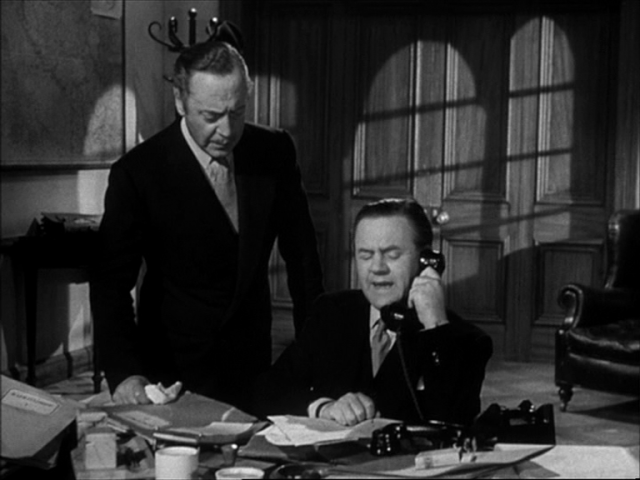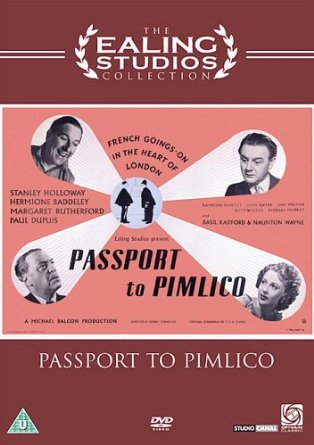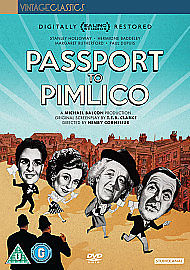|
Passport to Pimlico (1949) Directed by Henry Cornelius, Passport to Pimlico was screened at the 1949 Cannes film festival but not entered in the competion. This Ealing Studios comedy, starring Stanley Holloway and Margaret Rutherford, was based on a true incident in Canada during the Second World War; the maternity ward of Ottawa Civic Hospital was temporarily declared extraterritorial by the Canadian government so that, when Princess Margriet of the Netherlands was born there, she would not lose her right to the throne. Basil Radford and Naunton Wayne feature as Gregg and Straker, two civil servants cast in the same vein as Charters and Caldicott. Gregg and Straker are sent by the British Government to negotiate with residents of Pimlico who having found an ancient Charter from a bombed out site, declare themselves as citizens of Burgundy . The Burgundians, wanting to retain ownership of buried jewels, coins and art treasure found in the bomb crater, soon set up a n independant state free of bureaucratic restrictions and rationing. Following the declaration of independance, Londoners crossing the border to join in the free trade market cause chaos; the Burgundians are faced with rising crime, drunkenness and general lawlessness. The Burgundians are unable to control the free for all and the British Government wanting to force the return of Burgundy to Briatin close the border. With dwindling food and no electricity or water, the Burgundians force their own restrictions on the border. As Mrs. Pemberton (played by Betty Warren) says, "We've always been English and we'll always be English; and it's precisely because we are English that we're sticking up for our right to be Burgundians!" The infuraited British Government call off Gregg and Straker from their negotiations with the Duke of Burgundy and his Council. However, the Government soon relent to public pressure as people travel from all over London to throw food over the border to the starving Burgundians. The negotiations stumble on what will happen to the treaure until the Burgundian Council offer to give the treause as a Burgundian Loan to Britain. Click on the button below to see a series of behind the scenes images from the filming of Passport to Pimlico Passport To Pimlico Stills Gallery |
Facts about Passport To Pimlico
|
The Secret Life of Ealing Studios
The following comments are based on extracts from the excellent and informative book, The Secret Life of Ealing Studios by Robert Sellers, published by Aurum Press Ltd. (see above)
Ronnie Taylor was a focus puller on Passport to Pimlico and believed that Henry Cornelius was the perfect choice to make the film, having already been associate producer on several Ealing pictures. ‘He was a lovely, fairly elderly man but with a great sense of humour. I remember him as a very jokey kind of character, which came across in the film.’
Barbara Murray, the young actress, didn’t exactly see things the same way about Cornelius and working for him became a chore. 'Yes he was a brilliant man', she admitted, but he was also a perfectionist, ruthlessly determined to get exactly the shots he wanted at all costs. Nor did it help that he chewed on raw cabbage all day. And there was his temper. ‘He had a vicious tongue’ revealed Barbara. ‘And he would humiliate you in front of the extras.’
Ronnie Taylor also worked on the second unit that always attracted a large number of spectators whenever they arrived to start shooting. ‘We did have to control the crowds sometimes who came down to watch us. It was something quite new to see a film crew out in the street.’ Back in those days you didn’t need permission to shoot anywhere in London. ‘There was no bureaucracy or form filling or haggling with local councils’ says Ken Westbury. ‘All you did was tell the police where you were going to be and just started filming.’ It really was that simple. An assistant would call upon the local police station to say, ‘We want to film’, and the constable on duty would reply ‘Well go ahead but don’t expect any help from us and if you get to be a nuisance we’ll move you on.’ If you were lucky you might get a couple of off-duty policemen to stand by the set to handle any traffic.
‘The thing that always amazed me about London at that time was the bomb damage, how much of it was still there’, says Norman Dorme.
‘It took years and years to finally clear it up. At the end of the war with the Merchant navy, I was in Rotterdam, and that city had been bombed by the Allies, and I can remember looking out over the city and all the rubble had been cleared away. Back in London, all they did about these big holes was build a brick wall around them to stop people falling in, that’s about all that ever happened and they just left it for year after year after year’.
While the film was in post-production, at its final mixing stage, the government ceased rationing on many items and a despondent murmur ran round the studio that the public would regard the film as outdated. Peter Musgrave recalls that it was Cornelius who came to the rescue by ordering a brief insert to be added just after the main titles which read ‘Dedicated to the memory of –‘ before cutting to a shot of a laurel wreath surrounding an image of ration coupons and a clothing ration book. ‘If you view the film or a DVD you will notice that the title music runs out early leaving the insert silent; that’s because it was added after the music had all been recorded to the original timings. I saw the film in a public cinema soon after it came out and the audience laughed right away!’
The final touch to an instant classic was a whimsical score by French composer Georges Auric, who had already scored a number of Ealing films, including Dead of Night and Hue and Cry. Auric composed with remarkable speed, in part due to his fondness for opium, which may have stemmed from his association with Jean Cocteau, who was widely known to use opiates for artistic inspiration. Auric never became addicted, merely a casual and controlled smoker, and liked to boast to friends back in France that when working for Ealing or on other film assignments in London, he was able to maintain a steady supply of the drug in the form of a special dispensation personally sanctioned by George VI.
Ealing’s musical director, Ernest Irving, was one of the studios great characters. He had been with the studio since the Basil Dean era and was approaching his sixties when Balcon took over. It always amused Balcon that Irving was a musicologist and classic scholar, and yet he kept his apartment in a complete mess. He remained, though, a die-hard traditionalist, once ordering the London Philharmonic Orchestra to ‘remove all the metal junk with which modern orchestral string instruments are bedizened and to substitute (gut) strings, as used in the days of our forefathers.’ Irving always arrived for the recording sessions immaculately dressed in an off-white tropical suit and his tie from the Savage Club, one of the leading bohemian gentlemen’s clubs in London. On one occasion it was believed that Irving, who suffered from arthritis, would not be able to conduct a session. A replacement conductor was brought in and as he took his place on the rostrum, facing the orchestra ready to start, the doors burst open and Irving was brought in on a stretcher complete with white suit and tie. Propped up in a chair, he was able to complete the session.
Because Robert Winter played the piano and could read music he was often assigned the job of taking film clips down to Stage 3B, where he would project them for the London Philharmonic to rehearse and finally record the music. This led to an almighty bust-up one day with Irving.
He was convinced that the music didn’t fit the picture and wanted to know why. He pulled me over and said ‘What the hell of you been doing? Have you been re- editing it?’ Of course I hadn’t , I wasn’t the editor, I was just an assistant. Anyway, he had a real go at me, I must have been about twenty-two at the time, and I was so angry I blasted back ‘I’m not staying here for you to be rude to me,’ and walked out. That left nobody else to work the projector and there was the London Philharmonic, something like 60 musicians, together with a choir, with nothing to do. Finally the error was discovered, Irving had himself mis-timed all the music cues.
When he discovered the problem, I was sent a large box of Black and White Markovich cigarettes, along with his apologies, and asked to return immediately because they had this bloody great orchestra getting paid and not doing anything. We actually became good friends as a result, and he later gifted me a month of lessons with Louis Kentner, the concert pianist. I liked Ernest, he was a great chess player and lived in a large apartment right next to the studio so was always around.
The film substantially well at the box office, easily recouping its production costs. This was fortunate since the film had gone over schedule and over budget, largely due to poor weather conditions. Balcon also felt that some of the delays were due to Cornelius’ lack of directional experience and according to Barbara Murray there was an awful lot of friction between the two men during production. ‘Cornelius and Michael Balcon used to have the most terrible set-tos at the studio, which I used to secretly enjoy because you love to see a bully taken down.’ Afterwards Balcon tried to persuade Cornelius that his talents lay more in producing and he should give up his ambition to be a director. Only years later did Balcon feel his lack of faith in Cornelius was an error of judgement. Indeed so distraught was Cornelius by this that he walked out on the studio and never made another film for them.
There is another story, that on the back of the success of Passport To Pimlico, Cornelius demanded a raise, never a wise tactic with the frugal Balcon, and when he was turned down flat then promptly quit. Whatever the real reason, Cornelius formed his own production company and made The Galloping Major (1951), a sub-Ealing comedy about an ex-army officer who bands together with friends and neighbours to buy a racehorse, which unfortunately stiffed at the box office. Not long after, Cornelius pitched a comedy script to Balcon: it was about two couples involved in a veteran automobile rally from London to Brighton. Balcon found merit in the idea but his schedule for that year was already full so sent Cornelius over to Rank, who immediately recognised its potential and put it into production. Genevieve went on to become the second most popular film in British cinemas during 1953


